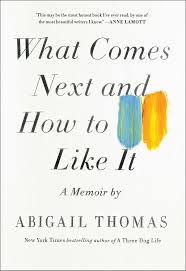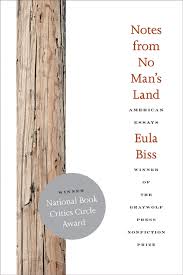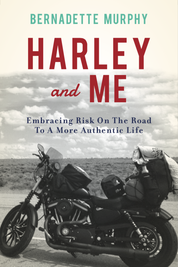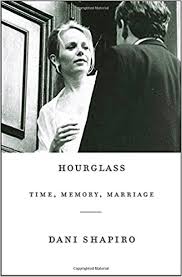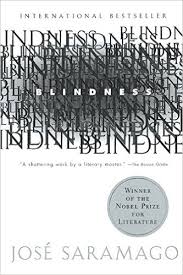|
Brief notes on recent books I've read. Harley and Me, former LA Times book critic Bernadette Murphy's memoir about becoming a motorcyclist, is a story of midlife transformation. Laden with neuroscience research and self-exploration, Murphy, mother of three on the brink of divorce, muses about identity and what it means, as she nears 50 and her father comes to the end of his life, to embrace living. With candid, straight-forward prose that chronicles her spiritual and sexual awakening from the seat of her Harley, this is a book of, ultimately, celebration and inspiration. It comes out in paperback this month, but the hardcover is already out. I can't close this section without telling you about Dani Shapiro's wonderful new memoir, Hourglass, a delicate, probing inquiry into time, memory, and marriage. I do so love her work. *** Notes from No Man's Land, by Eula Biss, and Blindness, by José Saramago (translated by Giovanni Pontiero): Both brilliant, both harrowing, I've been toggling between the two for the past week. If we read, at least in part, to better understand ourselves and human nature, the Biss, a collection of essays primarily concerned with America's relationship with race (Graywolf Press, 2009), and the Saramago, a novel about an almost-Ebola-like epidemic of blindness (Harcourt Brace, 1998), both seek to illuminate dark corners of the human psyche. Biss's opening essay is disquieting in its link between the invention of the telephone and the rise of lynching; Saramago's novel is chilling in its parable-examination of fear and society. But Andrew Miller's New York Times review of Blindness could be applied to both books: "There is no cynicism and there are no conclusions, just a clear-eyed and compassionate acknowledgment of things as they are, a quality that can only honestly be termed wisdom. We should be grateful when it is handed to us in such generous measures." *** Lately I've been reading the magnificent H is for Hawk by Helen MacDonald. The NY Times writes, "In her breathtaking new book, “H Is for Hawk,” winner of the Samuel Johnson Prize and the Costa Book Award, Helen Macdonald renders an indelible impression of a raptor’s fierce essence — and her own — with words that mimic feathers, so impossibly pretty we don’t notice their astonishing engineering." And here is what my friend, author Barbara Morrison, says: "She lays bare her emotional journey in language that is achingly precise with moments of grace that left me breathless. In a rare consensus, my book club all thought it a remarkable, if harrowing, story." If you haven't already, do read some Abigail Thomas. Her latest is What Comes Next and How to Like It, which is impossible to really sum up, but you will love it. It's about love, her children, drinking, her best friend, mortality, time.... Oh, how you will love it. You'll love Safekeeping too. So will all the people on your gift list. Just sayin...
1 Comment
Tap tapping at our laptops in tandem, Darby and I are having a quiet Sunday afternoon in the backyard, working separately on our books and getting pummeled with mulberries. Every year, I've stared up at this tree, wondering how it is that the squirrels always snatch the berries before me. The leafy canopy shades half the yard. Above us, the sturdy branch that the kidlets, when they were little, swung from on a tilted plank of wood that we strung up the first summer with chains. We got married under this tree on a hot September afternoon, Darby in a linen suit, me with my hair tamed back, the flies all drowned in honey on the cheese and crackers table. We've had picnics under this tree, a ratty old quilt spread with strawberries, lotus root, seaweed salad, and fresh bread from the farmer's market. We've had dinners with the kids, mac and cheese, kale chips, salad, on a white tablecloth with wine glasses filled (for them) with sparkling water. Oh, we've had many pies under this tree - never mulberry, but four-berry, strawberry, apple, blackberry basil, peach raspberry. It's a brief season for mulberries, and I never catch them in time. Each year around mid-April, I first notice the sidewalk splatted purple as I go for my lunch time runs on the other side of town. In our evening walks, Darby and I stand for long minutes alongside the road staining our fingers with the most delicious bruise, eating our fill. But did you know - mulberries can be white, too? Turns out, the berries in our tree never darken. No wonder I've always missed the season. These berries ripen and fall -- as they are doing on our heads and laptops today -- paler than spring green, softer than Darby's linen suit, plump and ready to eat. They're not as sweet as the dark ones, more austere somehow, if that's a flavor. But I'm overjoyed to realize that we're in season, and the squirrels haven't beaten me to the loot, and that if ever Darby kicks me out of the house, albeit there's a very small season, I might survive on the berries and rosemary sprigs. News on this end is that I've stopped sending my book to agents. Of course I'm impatient to publish it and to have some of you read it. Yet, I've not been able to put my finger on why, but I've wondered if, perhaps, something is missing in the narrative. A few weeks ago, I stumbled upon an idea. I can't tell you what it is, of course, but I've stopped sending out letters and started to explore this new thread. It's fully possible that, as Darby says, I'm driving past the money, but since I have all the previous versions it seems a fairly safe venture. And if this doesn't work, no hard in having a bunch of extra material, right? However, I do have a short piece just published last week by Lewis University's Jet Fuel Review. Here's a direct link to my piece, Cliff Side, and here's a link to the whole Spring 2017 issue. As former editor of Lunch Ticket, I'm a nut for different formats and love this - you can download the whole issue as an ebook, too. Here's a sneak peek at my piece, and I hope you'll click on over and read the whole thing: Echoed against the cliff walls of the ragged coastline, the bark of two elephant seals. Aaark, one calls, then moans like the creak of old redwood. Even through closed lids: the periwinkle grey of dawn. I open my eyes at the fifth cheer-up-up from a nameless bird in dialogue with its mate. A moment later, my husband opens his. We stare wide-eyed across the pillows. We traveled nine hours to perch on this cliff far from the segmented lives that fracture us, and spoke of nothing timely but the shortening blue shadows and play of sun along the grizzled backs of the golden central coast hills. Now, in the briny blue morning, we shove away the flannel sleeping bag and crawl out of the tent zipping our jeans. I balance on a weathered log; he stands on a rock. We survey the morning palette: sky against sea, dusty rose and slate grey, echoes of elephant seals and the crash of waves. I recently stumbled upon a Nietzsche passage that includes this quote: “Let the young soul survey its own life with a view of the following question: ‘What have you truly loved thus far? What has ever uplifted your soul, what has dominated and delighted it at the same time?” This is the spirit behind our Create & Flow one-day retreat in Los Angeles on Sunday, May 21. It's just a few weeks away, and there're still spots open. Just added - we'll be joined in the evening for a house concert songwriters-in-the-round with special guests, platinum songwriter, Kevin Fisher, and Journey of a Song author, Warren Sellars. Of course, I'll be part of the round, too, playing some new songs and some old. Yoga practitioners of all levels and creative spirits of all kinds are welcome. Registration is $185 and includes a light breakfast, lunch, and afternoon pie. Email [email protected] to register. Type 1 Diabetes is an autoimmune disease, genetically associated with other diseases in that category (e.g. rheumatoid arthritis, lupus, etc.), and renders an individual insulin-dependent. The pancreas, which otherwise works fine, stops producing beta cells that store and release insulin, a hormone which breaks down sugar from any kind of carbohydrate, whether simple or complex, and allows the body to use it for energy.
In the early months of 2015, as some of you know, our little one quickly got frightening skinny, was listless, insatiably thirsty, got up every two hours at night to use the bathroom. She was skinny because her body was starving and consuming all her body fat -- it couldn't process the sugar from food and use it for energy. She was listless because the brain depends on energy from sugar to properly function. She was thirsty because her blood sugar was way too high, and her body was trying to flush out the toxins. She had to pee, because she was drinking too much water. She couldn't sleep because she was in 5th grade and concerned she'd wet the bed. Her diagnosis, done easily with her pediatrician's prick of the finger to test her blood sugar levels, kicked off a full day of tests and T1D education for her and her four parents at Los Angeles Children's Hospital. She was pale, weak, frightened, and henceforth, until transitioning to an insulin pump later that autumn, on a every-three-hours glucose testing regimen (day and night) and 7-10 insulin shots a day. In equipment terms, that's 7-10 syringes daily, two types of insulin in two different vials plus backup in the event of emergency (e.g. earthquakes), 8-16 testing strips daily, alcohol swabs, a glucose testing monitor, many doctor visits, glucagon and an emergency kit in case she passes out from low blood sugar and can't ingest juice or another simple sugar by mouth. Since that autumn, she no longer needs regular shots because now she has a catheter with an inset stuck to alternating hips, changed every three days. The inset connects directly to a pump that looks like a pink pager hooked to the waistband of her clothes. Since the insulin is a constant drip, she doesn't need shots anymore in the arm or thighs, but we still have the back-up syringes in case the battery-operated pump fails. None of this addresses the depression that she entered the day she was diagnosed and didn't come out of for most of the year. Nor does it take into account the missed school days, because she was exhausted from bouncing blood sugar levels as the doctors tried to find the right ratios, and the public schools in our town, due to tight budgets, all share a nurse, who was only at her school periodically, and our girl was frightened that no knowledgeable adult was there to consistently help in case she needed it. It doesn't address the fact that she *did* need it, and so frequently just stayed home, and now, though money is tighter, goes to a Waldorf school with a class size less than a third of her public class, even with combined grades. It doesn't address how, for most of that first year, she didn't know how to eat because food was both necessary and a poison to her body. It doesn't address the mindless waiter who, just last week, brought her a regular Coke instead of diet, which shot her blood sugar sky high. And it doesn't address the lifetime of medical care and equipment that she will need just to manage this disease, to keep her healthy as she is right now, due to medical research, technology advances, JDRF advocacy and education, and Dr. Fisher and her incredible team at Children's Hospital Los Angeles. But, it does address the recent House vote to repeal and replace Obamacare with a system that does not protect those with previously diagnosed conditions, like T1D. If you know someone with T1D --- for example, our girl, now 13, --- consider sending this letter, which asks Congress to Consider Type 1 Diabetes Patients when the Senate looks to Reform the American Healthcare System. Feel free to use any of our story as part of your letter. https://www2.jdrf.org/site/Advocacy?cmd=display&page=UserAction&id=458 http://www.jdrf.org/press-releases/jdrf-issues-statement-opposing-revised-healthcare-legislation/ |
Archives
May 2019
Categories
All
|

